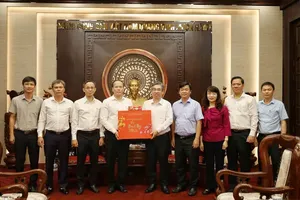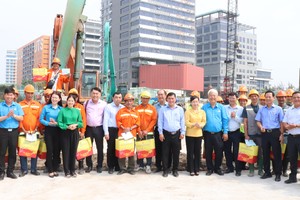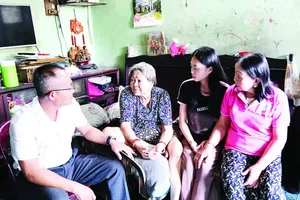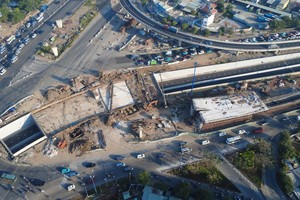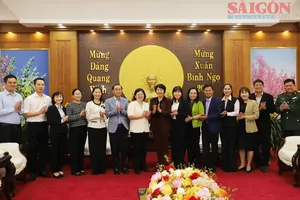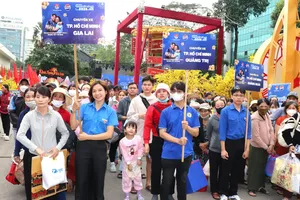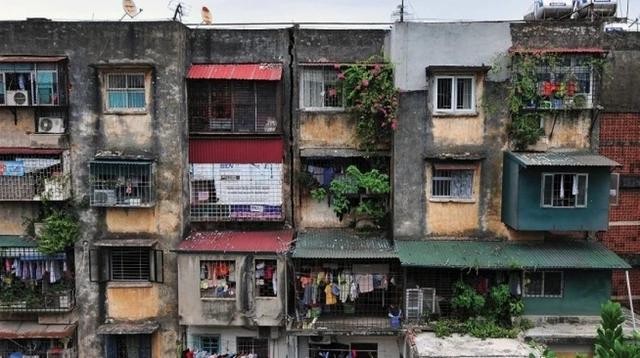
Chairman Truong Dinh Sam of the People's Committee of District 8’s Ward 4 noted that a survey conducted over a decade ago revealed the degradation of the Pham The Hien apartment building, prompting the district to initiate repairs. However, up to now, the apartment building has seriously degraded.
However, the chairman moaned that district administrators have submitted a proposal to city departments and agencies for the reconstruction of the apartment building, inviting potential investors, but has not yet identified suitable candidates.
Elsewhere in the southern largest city, Vice Chairman of District 4 People's Committee Vo Thanh Dung informed that seven years ago, after the local administrators paid visit to the Vinh Hoi apartment building and classified it, the old building has been red-flagged as "seriously degraded" by authorities.
In 2017 and 2020, the municipal People's Committee temporarily relocated 202 apartments in Tan My for residents of Vinh Hoi, with the District 4 People's Committee allocating VND5.4 billion for urgent repairs, yet temporary accommodation for the residents remains unarranged because the common infrastructure, including the elevator system, parking lot, and fire protection system, has not yet been repaired and transferred by the designated repair unit.
In relation to the development of the new apartment complex located at 155-157 Bui Vien Street, Vice Chairman Vu Nguyen Quang Vinh of the District 1 People's Committee stated that the district has recently chosen two competent companies to engage in the investment process. Nonetheless, this selection must be approved during the apartment building conference, where the residents of the building will ultimately determine the chosen investor.
Head Pham Dang Ho of the Department of Housing Development and Real Estate Market under the Ho Chi Minh City Department of Construction said that the safety of aging apartment buildings against potential collapse is consistently overseen and regularly assessed by local authorities.
He added that generally, when constructing a new apartment building on the site of an old one, residents should be relocated on-site, unless the land is deemed unsuitable for new development.
The city's temporary housing fund is currently sufficient to support the resettlement of people awaiting new construction.
The Housing Law has effectively addressed issues related to compensation, resettlement arrangements, and investor incentives through its policies and mechanisms.
Following the issuance of the Housing Law and accompanying guidelines, Ho Chi Minh City has formulated and suggested supplementary incentive measures. These include the waiver of fees associated with investment procedure streamlining, the provision for investors to secure loans at favorable interest rates, and government and city support for interest on these loans.
In addition, the budget will also cover costs related to relocation and the execution of relocation activities.
In order to fulfill the directive regarding the repair and reconstruction of 16 severely damaged apartment buildings, the Ho Chi Minh City Department of Construction has developed a comprehensive implementation plan. This plan prioritizes tasks, assigns specific responsibilities to relevant units, and outlines a detailed timeline for completion.
Head Pham Dang Ho said that the project to repair and rebuild old apartment buildings in Ho Chi Minh City is in its final stages and will be submitted to the city authorities for approval this month.
Meanwhile, Chairman Le Hoang Chau of the Ho Chi Minh City Real Estate Association commented that the 2023 Housing Law has provided basic solutions for the renovation of old apartment buildings.
The plan calls for consolidating the existing low-rise apartment buildings into a single, new high-rise building, which would provide enough housing for the current residents to relocate on-site.
The compensation and support system for renovating and rebuilding old apartment buildings has become more equitable between the building owners and project investors.
The temporary housing mechanism in the renovation of old apartments is also synchronized in both the Land Law and the Housing Law, facilitating the demolition and reconstruction of buildings.
The recently issued regulations on the renovation of old apartments have created more attractive investment mechanisms, drawing more investors than before. Investors in old apartment renovation projects can now earn profits ranging from 10-15 percent, up from the previous fixed rate of 10 percent. Enterprises investing in old apartment renovations are being encouraged to adjust their projects, such as by increasing the number of floors as said by HCMC Real Estate Association Chairman Le Hoang Chau.


